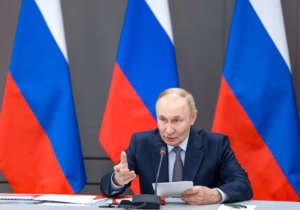In the wake of growing concerns over market volatility and escalating trade tensions, a top adviser to former President Donald Trump has insisted that the administration’s aggressive tariff policies are aimed at strengthening the U.S. workforce—not destabilizing the economy.
Appearing on ABC’s This Week, Kevin Hassett, the Director of the National Economic Council, addressed growing fears that the administration’s approach to tariffs could trigger economic uncertainty. Speaking with anchor George Stephanopoulos, Hassett dismissed the idea that Trump’s trade war was a ploy to crash the stock market, despite a controversial video Trump posted suggesting that short-term market pain could pressure the Federal Reserve into cutting interest rates.
“The American worker is the focus,” Hassett emphasized. “It’s not about targeting the stock market—it’s about rebuilding economic strength from the ground up.”
Tariffs: A Path to Higher Wages and Job Growth?

When pressed on the broader economic implications—particularly warnings from economists about potential price hikes—Hassett acknowledged there could be “some increase in prices.” However, he insisted that the long-term benefits would outweigh the short-term challenges.
Hassett argued that decades of prioritizing open trade and cheap imports, particularly from countries like China, had eroded the financial security of American families. “If past trade policies were truly making Americans better off, we would have seen real wages rise consistently,” he said. “Instead, wages stagnated or even fell, even as consumer goods became cheaper.”
Highlighting bipartisan support for fairer trade—citing figures like former President Barack Obama, Senate Majority Leader Chuck Schumer (D-N.Y.), and former House Speaker Nancy Pelosi—Hassett framed Trump’s policies as a continuation of a long-overdue effort to level the playing field for American workers.
“Just like he promised on the campaign trail, President Trump is keeping his word,” Hassett added.
Trump’s “Wild Chess Move” on Truth Social
Adding a layer of controversy, Trump recently posted a video to his Truth Social account suggesting that triggering a stock market dip could be a “wild chess move” to force the Federal Reserve’s hand on interest rates.
When asked directly about this provocative strategy, Hassett stood firm, saying: “He’s not trying to tank the market. He’s trying to engineer a golden era for American workers.”
He continued, “It’s a strategic move. The end goal is economic prosperity that prioritizes the middle class over Wall Street elites.”
A New Era of Economic Nationalism
Trump’s aggressive approach reflects a broader shift toward economic nationalism—a strategy that places American jobs and manufacturing at the center of national policy.
Critics argue that tariffs could backfire by raising costs for consumers and provoking retaliatory measures from trade partners. However, proponents claim that restoring domestic industries is essential for long-term national security and economic independence.
In a political climate increasingly skeptical of globalization, Trump’s message continues to resonate with many voters who feel left behind by decades of offshoring and industrial decline.




